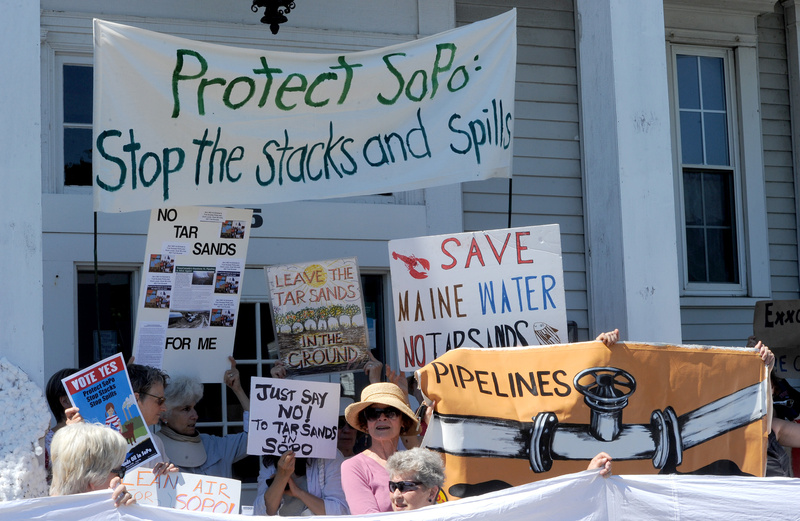SOUTH PORTLAND — A proposed ordinance aimed at banning so-called Canadian tar sands oil from flowing through South Portland could unintentionally shutter the petroleum industry there, critics of the measure said at a hearing Tuesday night.
Executives, attorneys and employees of South Portland’s largest oil-based businesses raised the alarm at the hearing before the South Portland Planning Board, where architects of the ordinance met face to face for the first time with the industrial interests poised to campaign against it.
“The effect of this ordinance over time would essentially be to shut down … petroleum-handling businesses in South Portland,” said Matt Manahan, who represents the Maine Energy Marketers Association, the Portland Pipe Line Corp., and a handful of other South Portland businesses connected to the petroleum industry.
“It goes much beyond the so-called tar sands oil. That may have been the intent, but for whatever reason, it was drafted in a way that is much, much broader,” Manahan said.
At the center of the controversy is the Portland-to-Montreal pipeline, operated by the Portland Pipe Line Corp., which currently ships crude oil from seafaring tankers more than 200 miles north to refineries in Montreal.
The proposed ordinance would effectively ban any future reversal of the pipeline by using zoning laws to strictly define only the unloading of petroleum products as an acceptable use.
Currently, Portland Pipe Line Corp. has no active proposal to reverse the flow but explored doing so in 2008.
The proposed ordinance also would bar the expansion of current petroleum facilities or the construction of new ones – a provision that detractors say would unintentionally ban a host of other permitted activities, such as the distribution of gasoline and heating oil, or the refueling of boats at local docks or marinas.
Proponents of the ordinance, which was submitted to the city in June as a citizen-initiative ballot question and garnered more than 3,700 signatures, say the law’s language is narrowly tailored and aligned with the city’s long-term comprehensive plan, and reflects the public’s goals.
The planning board, which may only make a recommendation to the City Council on whether the ordinance conforms to the city’s long-term planning vision, is expected to vote at its next meeting in August.
Natalie West, an attorney with the Concerned Citizens of South Portland who helped author the proposed ordinance, said that save for a few sentences, it conforms to the community’s values.
But business owners were concerned that allowing only the offloading of petroleum products could be construed to prevent gasoline and heating oil companies from distributing their products to Maine and New England, potentially sending gas and fuel-oil prices soaring.
“The language in the ordinance will prevent us from selling gasoline, diesel or home heating fuels from our facility,” said Nathan Stevens, a representative of Gulf Oil, which operates a regional distribution terminal at 175 Front St.
His concern was echoed by Jamie Py, president of the Maine Energy Marketers Association, an industry group that is preparing to mount an education campaign urging voters to reject the proposal, saying it would cost jobs, tax revenue and hurt the city’s vitality.
Larry Wilson, president of the Portland Pipe Line Corp., said residents of South Portland have been “duped” by scare tactics and unfounded environmental arguments. He urged residents to learn the facts and make an educated decision in November.
“You’ve heard a lot of innuendo and rhetoric, and I’m tired of it,” Wilson said. “The truth is on our side. We’re not evil people. We’re one of the finest pipeline operators in the country. “
Matt Byrne can be contacted at 791-6303 or at mbyrne@pressherald.com
Send questions/comments to the editors.




Comments are no longer available on this story